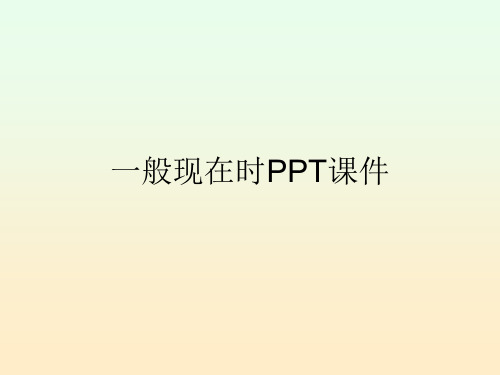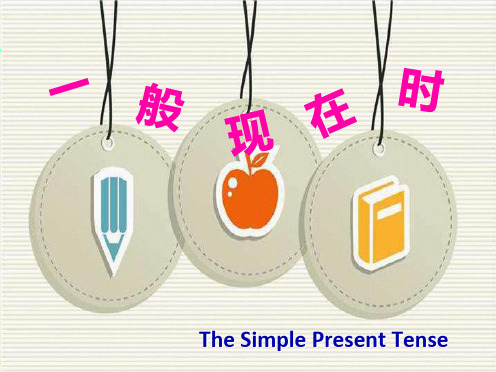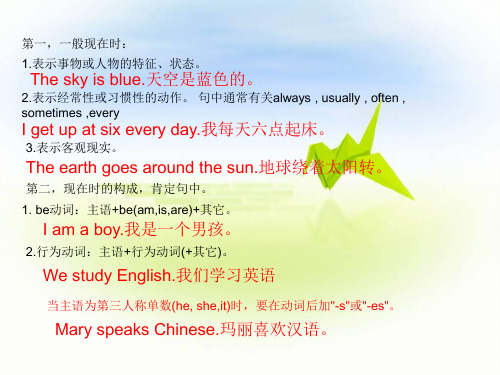一般现在时课件(很实用)
合集下载
一般现在时(课件)人教PEP版英语六年级下册

情况 一般动词 以x, sh, ch, s, tch结尾 以辅音字母加y结尾 以元音字母加y结尾 以o结尾 特殊情况
构成 加s 加es 去y,加ies 加s 加es
例词 comes, spells, waits, talks, sees, dances, trains
watches, washes, wishes, finishes study/studies, hurry/hurries, try/tries
③一般疑问句Do/Does+主语+实义动词原形+其他? Do you speak Chinese?
肯定回答 Yes,主语+do
Yes, we do.
否定回答 No,主语+don’t
No, we don’t.
④特殊疑问句 特殊疑问词+do/does+主语?
What does he do?
例句:①We have classes from Monday to Friday. 我们从周一到周五上课。 ②--- Do you often write to your friends? 你经常给你的朋友们写信吗?--- Yes, I do. /No, I don’t. 是的,我经常写。/不,我不经常写。
plays, says, stays, enjoys, buys does, goes
are/is, have/has
实战练习1--根据要求写句子。
1.Helen goes to school early. (改成否定句) ______________________________________________________ 2. That is a bus. (改成复数句子) ______________________________________________________ 3. I can read for a long time.(改成一般疑问句) ______________________________________________________ 4. Your mother is a doctor. (改成一般疑问句) ______________________________________________________ 5.My eraser is pink. (改成复数句子) ______________________________________________________
(完整版)一般现在时课件

一般疑问句: Be+主语+表语?
Are your parents doctors? Yes, they are./No, they aren’t. Is Mr Long 28 years old? Yes, he is./No, he isn’t.
2021:表示行为动作的词语
3. 经常、习惯、反复做的事情 We have lunch at 12:30. We go to school on Monday.
2021/6/29
be 动词的一般现在时:
be: am, is, are
用be动词的适当形式填空: I ‗a‗m‗‗ he‗‗is‗‗ she ‗i‗s‗‗
iti‗s‗‗‗ Tomis‗‗‗‗
否定句:
☺主语(I/We/You/They)+do+ not+动词原形+其他 I don’t watch TV on Sunday. ☺主语(He/She/It)+does +not+动词原形+其他 He doesn’t watch TV at home on Sunday.
2021/6/29
Practice:
5. 特殊情况 have– has
把下面的行为动词变为第三人称单数形式:
go―goes
carry―carries ride―rides
open―opens
have ― has
teach―teaches brush― brushes dey―deys
play―plays
finish―finishes
2021/6/29
1.一般情况直接加s e.g. reads, plays, works, makes
一般现在时ppt课件完整版

不可数名词作主语时,谓语动词用单数 形式。
可数名词单数作主语时,谓语动词也用 单数形式。
例如:Water is essential for life.(水 对生命至关重要。)/ A book is on the table.(一本书在桌子上。)
例外情况总结
当主语为并列主语时,谓语动词的数要与靠近它的主语保持一致。
练习3答案
reads。解析:主语 She 是第三人称单数 ,且时间状语为 on weekends,表示经 常性动作,所以谓语动词要用单数形式 reads。
THANKS
时间状语分类及举例
表示经常性或习惯性的动作
always, usually, often, sometimes
表示现在的状态或特征
now, at present, these days
表示普遍真理或客观事实
in general, as a rule
频率副词分类及举例
01
高频副词
always, constantly, continually
注意区分完全否定和部分否定。完全 否定表示全部否定,而部分否定表示 部分否定。例如,“None of the students passed the exam.”(没 有一个学生通过了考试)是完全否定 ;“Not all of the students passed the exam.”(并非所有学生都通过 了考试)是部分否定。
does he work?等。
动词短语和情态动词的变化规则
03
动词短语中的动词和情态动词后接动词原形,如I can swim,
they often go out等。
02 肯定句结构与用法
主语+动词原形+其他成分
(完整版)一般现在时PPT课件.ppt

7. Tom can not walk fast because he _c_a_r_r_ie_s(carry) a heavy box.
用动词的适当形式填空
1.She ____(go) to school at eight o’clock.
2. He usually _____ up at 17:00.(get )
直接加s
Fly-flies;ห้องสมุดไป่ตู้stay-stays
• 第三节 • 特殊疑问句
• I clean the window at home on Saturdays.
• 1、对主语提问:
• Who cleans the window at home on Saturdays?
• 2、对宾语提问:
Has David got a goal?
7. We have four lessons.(否定句) We don’t have four lessons.
8. Nancy doesn’t run fast (肯定句)
Nancy runs fast. 9. My dog runs fast. 否定句:My dog doesn’t run fast.
5. Danny_s_t_u_d_ie_s__(study) English, Chinese, Maths, Science and Art at school.
6. Mike sometimes g_o__e_s_(go) to the park with his sister.
7. At eight at night, she w__a_tc_hes (watch) TV with his parents. 8. _D_o_e_s_ Mike r_e_a_d_(read) English every day?
一般现在时课件ppt(共25张PPT)

Jim
➢ Jim plays computer games every Sunday.
➢ He goes to school on foot everyday.
➢ He goes to school on foot everyday.
大家来找茬
He work very late every day. -Does you study English yourself?
She usually eats breakfast at 7:00.
play => plays
go => goes
• 以o, s, sh, ch, x结尾的动词,在词尾加es
She often goes to school at 8:00.
=> teach teaches I go to school every weekday.
She usually eats breakfast at 7:00.
He never eats breakfast.
She often goes to school at 8:00. I go to school every weekday.
My piano is quite new.
The earth moves
box => boxes
fly => flies
• 以辅音字母加y结尾的动词,要先将y变成i,再加 es
*26个字母中除AEIOU五个元音字母外,其余皆为辅音字母
study => studis
guesses
finishes
carries
snows
stops
sees
drives
《小学一般现在时》课件

语连用
的选择
昨天我去图书馆借书。
我每天晚上看电视。
3 3.注意第三人称单数的变化
S he loves to sing .
4 搜索
一般现在时注意事项
八、练习题及答案分析
1 练习题
2 答案分析
1. 他们通常________(吃)晚 饭。
1. eat 2. do 3. W hat
2. W here ________ (do) you live?
3. ________ (what) tim e do you usually g o to bed?
3 搜索
一般现在时练习题及答案
四、表示经常性的副词
1 示例
always, often, usually
2 搜索
表示经常的副词
五、第三人称单数
1 变化规则
动词原形 + s/es
2 示例
H e runs fast.
3 搜索
第三人称单数的变化规则
六、一般现在时的用法
1 1.表示客观事实
水沸腾时产生蒸汽。
2 2.表示习惯或经常动作 3 3.表示现阶段的情况或
《小学一般现在时》PPT 课件
欢迎来到《小学一般现在时》PPT课件!在本课程中,我们将学习什么是一般 现在时以及它的句型和用法。
一、什么是一般现在时
1 定义
一般现在时用于描述客观事实、习惯性动作和现阶段的情况或状态。
2 示例
他们住在一个漂亮的城市里。
3 搜索
一般现在1 .肯定句结构
主语 + 动词
2 .否定句结构
主语 + do/does + not + 动词
3 .一般疑问句 结构
一般现在时公开课课件

针对性练习题及答案解析
解析
主语为第三人称单数,谓语动词 get应使用第三人称单数形式gets 。
练习题2
Rewrite
the
following
sentences in the simple
present tense.
针对性练习题及答案解析
She is studying English now.
Answer: She studies English.
解析:将现在进行时的句子改写为一般现在时,去掉be动词和动词的-ing形式,改为动词 的第三人称单数形式studies。
针对性练习题及答案解析
练习题3
Complete
the
dialogue with the
correct form of the
verb in brackets.
A
What _______ your brother _______ (do) in the evenings?
的动作或状态。
转换方法
一般情况下,将动词变为-ing形 式即可从一般现在时转换为现在
进行时,反之亦然。
与过去时、将来时的关联及使用场景
与过去时的关联
一般现在时可以表示过去发生的动作对现在产生的影响或结果。
与将来时的关联
一般现在时可以表示按照计划、安排或时间表将要发生的动作或状 态。
使用场景
描述经常发生、习惯发生或普遍存在的动作或状态;表达客观事实 、真理或普遍规律;引用书籍、文章等中的观点或事实。
解析
此句使用了一般现在时,表示习惯性或经常性的动作。 主语为第一人称单数,谓语动词have用原形。
例句2
She often goes shopping on Sundays.
初中英语一般现在时学习课件(共25张ppt)

Watch TV
I often ( ) TV at 8:00.
my father and I go swimming every sunday
My father and I ( ) swimming every Sunday
we play football every Wednesday
We ( ) football every Wednesday.
•9、要学生做的事,教职员躬亲共做;要学生学的知识,教职员躬亲共学;要学生守的规则,教职员躬亲共守。2021/8/312021/8/31Tuesday, August 31, 2021 •10、阅读一切好书如同和过去最杰出的人谈话。2021/8/312021/8/312021/8/318/31/2021 7:50:25 AM •11、只有让学生不把全部时间都用在学习上,而留下许多自由支配的时间,他才能顺利地学习……(这)是教育过程的逻辑。2021/8/312021/8/312021/8/31Aug-2131-Aug-21 •12、要记住,你不仅是教课的教师,也是学生的教育者,生活的导师和道德的引路人。2021/8/312021/8/312021/8/31Tuesday, August 31, 2021
• You have to believe in yourself. That's the secret of success. 人必须相信自己,这是成功的秘诀。
•
Exercise
• 8.I ( ) a boy. • 9.You ( ) a girl. • 10.He ( ) a teacher.
Homework(家庭作业)
1.将所学内容重新看一遍。 2.当一回小老师,给爸爸妈妈讲解什 么是一般现在时。Fra bibliotek是辅音字母
一般现在时(示范课)ppt课件精选全文

精选课件
27
• 3. Daniel enjoys playing computer games.
• (改为一般疑问句并做肯定回答)
Does Daniel enjoy playing computer games?
Yes, he does.
精选课件
28
补充:some、any
• 一般说来,some 用于肯定句中,any 用于 否定句和疑问句中 。
Change the following sentences after the models.
Model 1: I like fish. (meat) I don’t like meat.
Model 2. He likes reading. (writing) He doesn’t like writing.
改疑问句或否定句时,原句里的some要改成any
There are some books on the desk. (改为否定句)
→There aren’t any books on the desk.
→Are there any books on the desk?
精选课件
29
Why not buy some apples? 为什么不买些苹果呢?
精选课件
26
句型转换
• 1. Mr. Green comes from Shanghai. • (改为一般疑问句)
Does Mr. Green come from Shanghai?
• 2. Millie lives in a flat in Beijing. • (改为否定句)
Millie doesn’t live in a flat in Beijing.
第四章 时态 第1节 一般现在时(课件)通用版英语六年级下册

对应训练
单项选择。
( B )1.My brother ________ a teacher. He ________ his pupils.
A.is;like
B.is;likes
C.are;likes
( A )2.Summer ________ spring.
A.follows
B.followed
知识点4 一般现在时的用法
1.表示经常性或习惯性的动作,常与频度副词(often、usually、 never等)连用。如: Tom usually goes to play tennis after school. 汤姆经常放学后打网球。 2.表示客观存在的真理或科学事实。如: The earth moves around the sun. 地球围绕着太阳转。
4.have _h_a_s____
5.guess _g_u_e_s_se_s_
6.catch _c_a_tc_h_e_s_
7.carry _c_a_rr_i_es__
8.push __p_u_sh_e_s_
9.say ___s_a_y_s_
10.go __g_o_e_s__
11.be ___is____
A.have
B.having
C.are having
( B )3.Don’t be lazy. The early bird ________ the worm.
A.catch
B.catches
C.catching
( B ) 4.My classmate Tom ________ he ________ milk before
小升初英语 总复习课件 (通用版)
第 1 节 一般现在时
小学一般现在时-实义动词ppt课件

(2)结尾是s, x, sh, ch, o,前为辅音字母,
watches teaches goes does washes brushes
(3)动词末尾y前为辅音:将y改为i加es: study→studБайду номын сангаасes fly→flies carry→carries cry→cries
但在y前如果为元音则直接加s buys says
Mary speaks Chinese.玛丽喜欢汉语。
1. be动词的变化。
否定句:主语+ be + not +其它。 如:He is not a worker.他不是工人。
一般疑问句:Be +主语+其它。 如:
-Are you a student
-Yes. I am. / No, I'm not.
二、变一般疑问句并作肯定和否定 回答。
• 1.He wants a book. • 2. Jimmy washes hands before dinner. • 3. Lisa likes milk very much. • 4. They walk to school. • 5. Lingling and Dandan are 10 years old. • 6. I am Chinese. • 7. Ben is from America.
当主语为第三人称单数时,要用does构成一般疑 问句。如:
- Does she go to work by bike? - Yes, she does. / No, she doesn't.
三.第三人称单数的动词变化规则(只有在第 三人称为主语的肯定句中,动词才用三单式)
(1)多数动词直接加s: runs gets likes takes plays climbs
watches teaches goes does washes brushes
(3)动词末尾y前为辅音:将y改为i加es: study→studБайду номын сангаасes fly→flies carry→carries cry→cries
但在y前如果为元音则直接加s buys says
Mary speaks Chinese.玛丽喜欢汉语。
1. be动词的变化。
否定句:主语+ be + not +其它。 如:He is not a worker.他不是工人。
一般疑问句:Be +主语+其它。 如:
-Are you a student
-Yes. I am. / No, I'm not.
二、变一般疑问句并作肯定和否定 回答。
• 1.He wants a book. • 2. Jimmy washes hands before dinner. • 3. Lisa likes milk very much. • 4. They walk to school. • 5. Lingling and Dandan are 10 years old. • 6. I am Chinese. • 7. Ben is from America.
当主语为第三人称单数时,要用does构成一般疑 问句。如:
- Does she go to work by bike? - Yes, she does. / No, she doesn't.
三.第三人称单数的动词变化规则(只有在第 三人称为主语的肯定句中,动词才用三单式)
(1)多数动词直接加s: runs gets likes takes plays climbs
- 1、下载文档前请自行甄别文档内容的完整性,平台不提供额外的编辑、内容补充、找答案等附加服务。
- 2、"仅部分预览"的文档,不可在线预览部分如存在完整性等问题,可反馈申请退款(可完整预览的文档不适用该条件!)。
- 3、如文档侵犯您的权益,请联系客服反馈,我们会尽快为您处理(人工客服工作时间:9:00-18:30)。
does his mother __(do) the housework?
- 新世纪教育网版 权所有
改句子 1. Do you often play football after school? (肯定回答) Yes, I do. 2. I have many books. (改为一般疑 问句并作否定回答)
11. I usually play football on Friday afternoon. 一般疑问句: Do you usually play football on ..?
划线提问 What do you usually do on Friday afte
- 新世纪教育网版 权所有
划线提问:
What do you do at home?
- 新世纪教育网版 权所有
对划线部分提问
3.It’s Wednesday today. What day is it today? 4.His favourite sport is basketball. What’s his favourite sport? 5.My brother works in Shenzhen. Where does your brother work? 6.One of my classmates comes from Australia. Where Does one of your classmates come from? 7.Lucy usually gets up at 6:30 in the morning. When does Lucy get up in the morning?
- 新世纪教育网版 权所有
14. Tom does his homework at home. 一般疑问句 : his homework at home? Does Tom do 划线提问:
What does Tom do at home?
15.We do our homework every day.
Do you do your homework? 3.They do their homework.
Do they do their homework?
- 新世纪教育网版 权所有
10. Mike has two letters for him. 一般疑问句: Does Mike have two letters for him?
watches 7. At eight at night, she ____ (watch) TV with his parents.
DoesMike read 8. _____ ____(read) English every day?
- 新世纪教育网版 权所有
9. How many lessons _____ does your classmate ______(have) on have Monday?
Yes,I do.
4. She lives in a small town near New York. (改为一般疑问句)
5. I watch TV every day. (改为一 般疑问句) Do you watch TV every day? 6. David has got a pen. (改为一 般疑问句)
Does she live in a small town Near New York?
Has David got a pen?
- 新世纪教育网版 权所有
7. We have four lessons.(改为 一般疑问句,并作肯定回答) Do you have four lessons? Yes,we do. 8. My dog runs fast.
12. Su Yang usually washes some clothes on Saturday. Does Su Yang usually wash any clothes on Saturday. 一般疑问句 : 划线提问 : Yang ususlly do on Saturday? What does Su 13. Mingming usually waters the flowers every day 一般疑问句: 划线提问:
- 新世纪教育网版 权所有
5. Danny________(study) English, studies Chinese, Maths, Science and Art at school.
6. Mike sometimes goes _____(go) to the park with his sister.
Tom does his homework.(用they 改写)
They do their homewrk.
- 新世纪教育网版 权所有
将下列句子改为一般疑问句并有做否定回答:
1.He does his homework. Does he do his homework? 2.We do our homework.
Do you have many books?
3. Gao Shan’s sister likes playing table tennis (改为一般疑问句)
Does Gao Shan’s sister like playing table tennis?
- 新世纪教育网版 权所有
(一般疑问句并否定回答): Does your dog run fast?
No,it isn’t.
- 新世纪教育网版 权所有
I do my homework.(用He 改写)
He does his homework. She does her homework.(用we改写) We do our homework.
我渴望听到每一个同学的回答!
- 新世纪教育网版 权所有
用动词的适当形式填空
play (play) on the 1. We often _____ playground. gets (get) up at six 2. He ______ o’clock. Do brush(brush) your 3. _____ you _____ teeth every morning?
- 新世纪教育网版 权所有
改句子 1. Do you often play football after school? (肯定回答) Yes, I do. 2. I have many books. (改为一般疑 问句并作否定回答)
11. I usually play football on Friday afternoon. 一般疑问句: Do you usually play football on ..?
划线提问 What do you usually do on Friday afte
- 新世纪教育网版 权所有
划线提问:
What do you do at home?
- 新世纪教育网版 权所有
对划线部分提问
3.It’s Wednesday today. What day is it today? 4.His favourite sport is basketball. What’s his favourite sport? 5.My brother works in Shenzhen. Where does your brother work? 6.One of my classmates comes from Australia. Where Does one of your classmates come from? 7.Lucy usually gets up at 6:30 in the morning. When does Lucy get up in the morning?
- 新世纪教育网版 权所有
14. Tom does his homework at home. 一般疑问句 : his homework at home? Does Tom do 划线提问:
What does Tom do at home?
15.We do our homework every day.
Do you do your homework? 3.They do their homework.
Do they do their homework?
- 新世纪教育网版 权所有
10. Mike has two letters for him. 一般疑问句: Does Mike have two letters for him?
watches 7. At eight at night, she ____ (watch) TV with his parents.
DoesMike read 8. _____ ____(read) English every day?
- 新世纪教育网版 权所有
9. How many lessons _____ does your classmate ______(have) on have Monday?
Yes,I do.
4. She lives in a small town near New York. (改为一般疑问句)
5. I watch TV every day. (改为一 般疑问句) Do you watch TV every day? 6. David has got a pen. (改为一 般疑问句)
Does she live in a small town Near New York?
Has David got a pen?
- 新世纪教育网版 权所有
7. We have four lessons.(改为 一般疑问句,并作肯定回答) Do you have four lessons? Yes,we do. 8. My dog runs fast.
12. Su Yang usually washes some clothes on Saturday. Does Su Yang usually wash any clothes on Saturday. 一般疑问句 : 划线提问 : Yang ususlly do on Saturday? What does Su 13. Mingming usually waters the flowers every day 一般疑问句: 划线提问:
- 新世纪教育网版 权所有
5. Danny________(study) English, studies Chinese, Maths, Science and Art at school.
6. Mike sometimes goes _____(go) to the park with his sister.
Tom does his homework.(用they 改写)
They do their homewrk.
- 新世纪教育网版 权所有
将下列句子改为一般疑问句并有做否定回答:
1.He does his homework. Does he do his homework? 2.We do our homework.
Do you have many books?
3. Gao Shan’s sister likes playing table tennis (改为一般疑问句)
Does Gao Shan’s sister like playing table tennis?
- 新世纪教育网版 权所有
(一般疑问句并否定回答): Does your dog run fast?
No,it isn’t.
- 新世纪教育网版 权所有
I do my homework.(用He 改写)
He does his homework. She does her homework.(用we改写) We do our homework.
我渴望听到每一个同学的回答!
- 新世纪教育网版 权所有
用动词的适当形式填空
play (play) on the 1. We often _____ playground. gets (get) up at six 2. He ______ o’clock. Do brush(brush) your 3. _____ you _____ teeth every morning?
